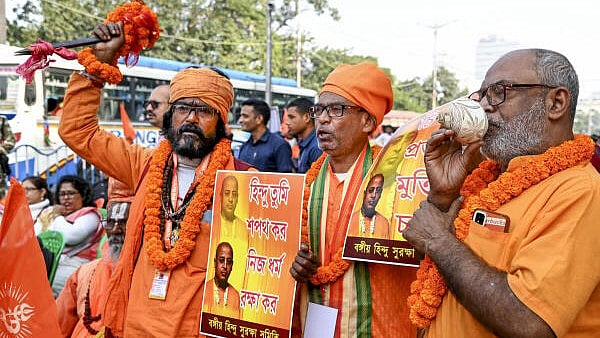
Monks take part in a rally on the occasion of 'Vijay Diwas', to protest against the alleged atrocities over Hindu minorities in Bangladesh, in Kolkata.
Credit: PTI Photo
When do we realise that the politics of communalism, or the mischievous act of dividing people on the basis of religious identities, thereby fostering a toxic environment filled with hatred and violence, goes against our noblest aspirations for a society that values empathy, the ability to live with cultural/religious pluralism, and the courage to nurture the ethos of democratic coexistence?
Is the Indian subcontinent—tormented by the traumatic memory of Partition violence—incapable of learning this important lesson? Or are we, instead, destined to remain trapped in cycles of communal politics and religious bigotry?
Consider, for instance, what is happening in Bangladesh. Following the fall of Sheikh Hasina’s Awami League government amid public uprisings and massive student protests against her alleged autocratic rule, the interim government led by Muhammad Yunus faces mounting challenges. Fundamentalist Islamist forces, such as Jammat-e-Islamia, which Hasina had managed to subdue, are resurging.
And subsequently, the politics of majoritarianism has begun to demonise the minorities—Buddhists, Christians, and mainly Hindus. As reports indicate, there were attacks on temples and puja mandaps during the recent Durga Puja festival in Bangladesh. According to Manindra Kumar Nath—the acting general secretary of the Bangladesh ‘Hindu Buddhist Christian Council’—2,010 incidents of attacks, including murder, molestation, and kidnapping, were reported against minorities in Bangladesh in recent times.
Furthermore, the arrest of the much-controversial religious leader Chinmay Krishna Das on sedition charges caused anxiety among the minorities—particularly, the followers of the Bangladesh Sanatan Jagaran Mancha.
The Indian government, as External Affairs Minister Jaishankar’s statement suggests, took a ‘serious note’ of these incidents and shared its ‘concerns’ with the Government of Bangladesh. Furthermore, many ‘Hindu organisations’ expressed their ‘anxiety’ over the state of Hindu minorities who constitute merely 8 per cent of the 170 million Bangladeshi population.
In fact, this anguish manifested itself in yet another form of violence. A group of ‘protestors’ entered the consulate building of Bangladesh in Agartala and vandalised it. In West Bengal, the BJP leader Subhendu Adhikari—not particularly known for promoting the ethos of secularism—protested against the atrocities on Hindus in Bangladesh with all sorts of aggressive gestures. And even some hospitals in West Bengal and Tripura chose to forget the medical ethics and decided not to treat patients from Bangladesh!
In fact, if you and I dare to be authentic and contemplative, it will not be difficult for us to realise that our response to the Bangladesh crisis is primarily hypocritical; it reveals our double standard, or our inability to look at our own engagement with the minorities in India. Can the ruling regime known for its Hindu supremacist thinking be bothered to look at its own record?
From mob lynching to cow vigilantism; from the normalisation of ‘bulldozer justice’ to the triumphant agenda of ‘discovering’ the ruined temples beneath the series of mosques; from the horror of the 2002 riots in Gujarat to the organised effort to demonise the Muslims as “termites” or “Babur ki aulad”; or from the politics beneath the Citizen Amendment Act and National Register of Citizens to the fact that there is not even a single Muslim MP in the BJP—the harsh reality is that there is no reason to feel proud of the social/political dignity of the Muslim population in India.
In fact, an ideology rooted in the discourses of Golwalkar, Savarkar, and Godse will denounce Nehru’s secular humanism or Gandhi’s engaged religiosity of love and compassion. Possibly, their ‘concern’ for the minorities in Bangladesh is merely a pretension; it is just a Machiavellian tool for stimulating the Hindu crowd in India to further demonise their ‘Muslim enemies’ and legitimise the ideology of hyper-masculine Hindu nationalism.
Is there any possibility of the subcontinent freeing itself from the vicious cycle of militant Hindutva vs Islamic fundamentalism? Of course, it is possible if we move towards a new politico-cultural awakening. It requires a clear understanding of the fact that the social psychology of religious fundamentalism is deeply related to the rise of right-wing nationalism and associated authoritarianism.
In other words, if we wish to preserve a democratic, secular culture, it is important to fight the unholy alliance of populist/charismatic authoritarian leaders and religious fundamentalists. Likewise, it is important to realise that the politics of religious fundamentalism is inherently against the spirit of spiritual wonder or the religiosity of love and compassion.
Far from inspiring us to meditate on life and death, the finite and the infinite, or time and timelessness, and live every moment with mindfulness and gratitude, the anger implicit in the discourse of religious fundamentalism keeps constructing the ‘enemies’—from the minorities to the immigrants. If spirituality is about love and oneness, religious fundamentalism is about division and hatred.
And finally, it is important to create a new kind of politics that strives for an egalitarian and inclusive civic culture, resists all sorts of mental and physical ghettoisation, and prioritises truly important issues like social and economic justice for all rather than whether one should visit Mecca or Ayodhya for ‘salvation’!
However, as it is becoming increasingly difficult to find the proponents and practitioners of this kind of political culture, the danger is that the subcontinent might witness more and more communal hatred, majoritarian aggression, militarism, and cultural decadence, and simultaneously the rise of neoliberal fascists.
(The writer taught at JNU for more than three decades)